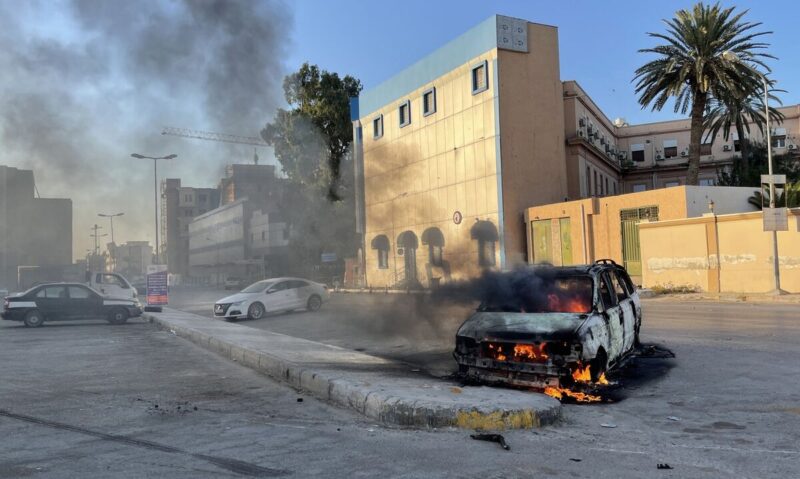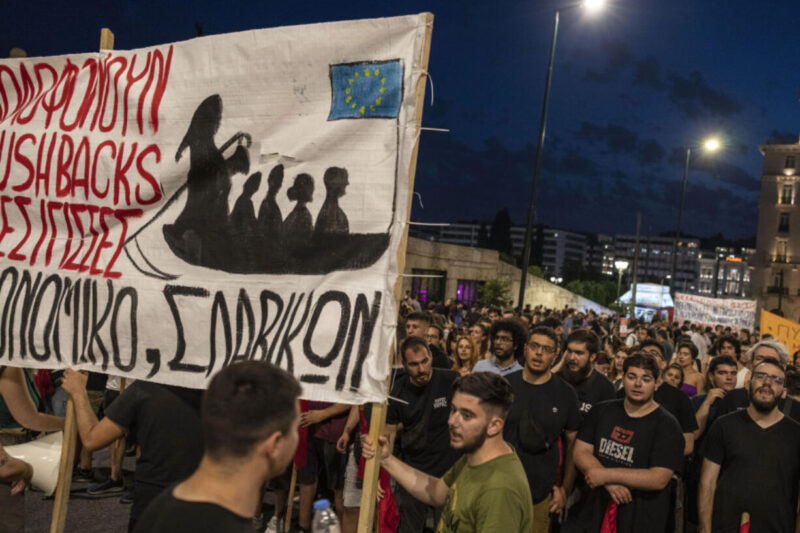On 14 June 2023, a fishing boat, called the Andrianna, carrying over 750 refugees sank in the Ionian Sea off the coast of Pylos, Messenia, Greece. Greek authorities have recovered just over 100 people and just over 80 bodies from the sinking. The Greek coast guard reported that the ship was heavily crowded with migrants. Distress calls indicated that the captain had already abandoned the ship, leaving the onboard migrants in a desperate situation.
In Greece, Opposition leader Alexis Tsipras voiced his concerns, criticizing the absence of proper rescue measures and condemning European migration policies, which he blamed for turning the Mediterranean into watery graves.
The business of trafficking poor migrants is a direct result of the ongoing conflicts occurring in North Africa, particularly Libya that emerged following the assassination of Muammar Gaddafi in 2011. The political instability that ensued led to the development of migrant smuggling businesses that would repatriate fleeing families to Europe. The migrants from this particular tragedy were en route to Italy.
How the Libyan crisis emerged
The roots of the crisis can be traced back to the Second Libyan Civil War and the subsequent peace process. The conflict came to a ceasefire on 23 October 2020, marking the end of the Second Libyan Civil War. In an effort to establish stability, the Government of National Unity (GNU) was formed on 10 March 2021, with Abdul Hamid Dbeibeh assuming the position of prime minister. However, this unity government faced significant challenges.
On 21 September 2021, the House of Representatives expressed a vote of no confidence against the unity government, further exacerbating the political tensions. This led to a divide within the government, with different factions supporting different prime ministers. Notably, on February 10, 2022, the House of Representatives appointed Fathi Bashagha as prime minister, a decision rejected by Dbeibeh and the GNU.
This led to the Tripoli clashes of 2022. On 17 May, the parliamentary-appointed government, led by Bashagha, arrived in Tripoli, triggering hours of intense fighting between armed groups. Eventually, the government team was compelled to withdraw from the city.

Tensions escalated further on 27 August, as clashes intensified between factions aligned with Bashagha and those affiliated with Dbeibeh. During this period, fighters supporting Bashagha fired upon a convoy, while Dbeibeh-affiliated groups stormed a military base. The clashes resulted in the loss of numerous lives, with 32 people killed and 159 others injured.
Subsequent clashes erupted in September on the western outskirts of Tripoli. This series of confrontations witnessed forces aligned with the GNU, under Dbeibeh’s leadership, consolidating control in the area.
The connection between the Libyan crisis and the Mediterranean migrant smuggling ring is undeniable. The ongoing political turmoil, violence, and instability in Libya have created a volatile environment conducive to the thriving smuggling operations for refugees. Forced to flee the dire circumstances within the country, many individuals and families have been compelled to embark on the perilous journey across the Mediterranean, further exacerbating the already dire situation.
How deadly is migrant smuggling?
Estimates state that nearly 21,000 people have died trying to travel through the Mediterranean since 2014. People can be forced to lock up for days while at sea, and the ships used to transport them are very unsafe. Every year, thousands of people die in the journey. While the network was developed in response to the Libyan crisis, refugees and migrants from many nationalities have travelled this way.
Greece Employs Border Wall Extensions to Prevent Afghan Refugees From Entering Europe
How did the Greek government react?
Greek authorities have already arrested nine men who they believe to be connected with the smuggling ring. They are all of Egyptian descent and will be charged with a variety of crimes, including mass murder.
In Greece, three days of national mourning were declared in response to the deaths of their shored. Greek President Katerina Sakellaropoulou visited survivors, offering condolences and solidarity. Many people in Greece, including politicians realized that the tragedy was partly a result of the previous conservative government’s strict migration policies, characterized by tightened border controls and a propensity to turn away boats carrying migrants and refugees.
How did the Greek people react?
Public outrage and protests against these migration policies quickly spread across Greece. Left-wing organizations, trade unions, and political parties organized demonstrations to express their support for refugees and their dissatisfaction with EU migration policies. Some of these protests turned violent, with clashes between protesters and police occurring in Athens. Tear gas filled the air as a small group resorted to throwing petrol bombs. In Kalamata, protesters gathered near migrant facilities, highlighting their opposition to the EU’s migration pact and denouncing what they perceived as insincere responses to the incident.

How should we understand this crisis?
It is important to stress how the growing xenophobia and anti-immigrant policies in Europe, along with the callous international war machine, directly contributed to the disaster. The illegal and unregulated sea routes were developed in response to the ongoing conflicts in Northern Africa and the Middle East. These conflicts are a direct result of policies pursued by foreign countries, particularly Western powers, to destabilize the region and keep them in a perpetual state of war. The Libyan Civil War was a direct outcome of the War on Terror led by the United States, leading to a seemingly unending conflict which is only getting fueled.
Rather than recognizing the crisis and giving victims of intense conflict safe passage, xenophobic policies have driven the migration underground so they can be exploited in Europe as cheap labour. Years of demonizing international migrants led to a situation where disasters like this are actually very regular, leading to thousands of seats annually. Western powers have already profited from decades of cheap labour in the informal economy and have a responsibility to at least ensure the safety of the waves that are resulting from the conflict. Even without this history, humane policies should ensure that people fleeing conflict should be ensured some sort of safety.



